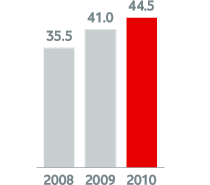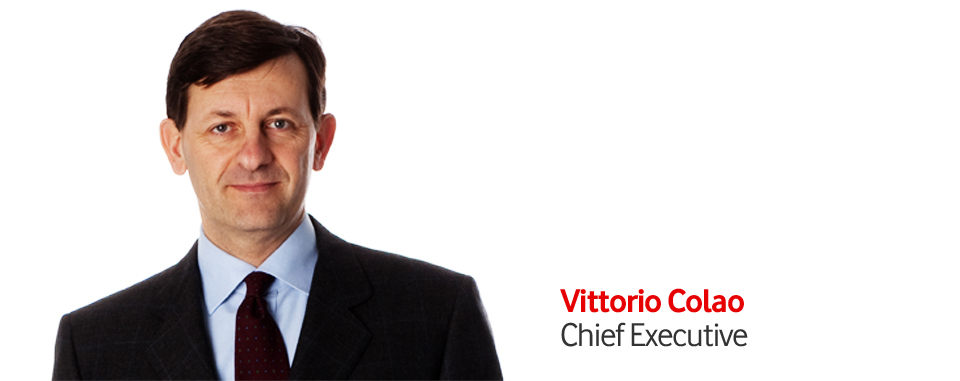Chief Executive’s review
In a challenging economic environment our financial results exceeded our guidance on all measures, we increased our commercial focus, delivered our cost reduction targets ahead of schedule and maintained strong capital investment levels.
Financial review of the year

Free cash flow
£7.2bn
up 26.5%
Revenue (£bn)

- 2010 financial results were ahead of guidance on all measures.
- Increased revenue contribution from our targeted growth areas in data, fixed line and emerging markets.
- Free cash flow generation of £7.2 billion, up 26.5%.
We have made significant progress in implementing our strategy. We now generate 33% of service revenue from products other than mobile voice reflecting the shift of Vodafone to a total communications provider. In particular, mobile data and fixed broadband services continue to grow while we increased the contribution being made by our operations in emerging economies, primarily by gaining market share. We have reduced costs and working capital to manage better in the recessionary environment while maintaining investment in our networks.
As a result, Vodafone’s financial results are ahead of the guidance range we issued in May 2009 and the upgraded guidance we issued in February 2010. The Group generated free cash flow of approximately £1 billion ahead of our medium-term target established in November 2008 even after adjusting for beneficial foreign exchange.
The economic situation has remained challenging throughout the year affecting our business in several ways. In our more mature European and Central European operations, voice and messaging revenue declined and roaming revenue fell due to lower business and leisure travel. In addition, enterprise revenue declined in Europe as our business customers reduced activity and headcount. However, results in Africa and India remained robust driven by continued, albeit lower, GDP growth and increasing market penetration. During the course of the financial year the impact of the global slowdown on the Group’s financial performance has diminished somewhat with Group service revenue declining in the fourth quarter by only 0.2%(*), better than the preceding three quarters and the second successive quarterly improvement.
In the full year Group revenue increased by 8.4% to £44.5 billion, declining 2.3%(*) after excluding benefits from foreign exchange and acquisitions. The Group’s EBITDA margin declined by 2.2 percentage points to 33.1%, in line with our expectations, primarily as a result of lower revenue in Europe and the greater weight of lower margin operations in emerging economies. Group adjusted operating profit was £11.5 billion, with a growing contribution from Verizon Wireless and foreign exchange benefits offsetting weaker performance in Europe.
Group free cash flow was £7.2 billion, up 26.5%, benefiting from significant improvements in working capital management and a deferred dividend from Verizon Wireless. This exceptional level of cash flow was generated whilst maintaining capital investment, developing fixed broadband services in Europe, funding the turnaround in Turkey and Ghana, and expanding in India.
At the year end we had 341 million proportionate mobile customers worldwide.
Europe service revenue declined by 3.5%(*). Data and fixed line revenue growth was strong but this was more than offset by ongoing voice price reduction and lower volume growth in our core voice products. Europe’s EBITDA margin declined by 1.0 percentage point, at about the same rate as the previous year, reflecting lower revenue, increased commercial activity, reduced cost and the increased contribution from lower margin fixed broadband. Operating free cash flow was strong at £8.2 billion.
Africa and Central Europe service revenue declined by 1.2%(*), with good revenue growth at Vodacom and a much stronger result in Turkey being offset by the impact of weaker economies in Central Europe. The EBITDA margin declined by around 2 percentage points, due to lower profitability in Turkey where we have focused on investment in the network, distribution, driving market share and brand visibility.
Asia Pacific and Middle East service revenue increased by 9.8%(*), reflecting another strong contribution from India where service revenue grew by 14.7%(*). During the 2010 financial year we attracted 32 million customers in India and in March we exceeded the 100 million customer mark. In a very competitive pricing environment we were pleased to have confirmed our number two position in the market. Since Vodafone’s entry into India in 2007, our performance has been strong. We have gained about 1 percentage point per annum in revenue market share, added 72 million customers, moved the business into operating free cash flow generation and launched Indus Towers, the world’s largest tower company with more than 100,000 towers under management. However the introduction of six additional national mobile licences one year after our entry and the resulting intense price competition have led to a £2.3 billion impairment charge. In Australia our joint venture company with Hutchison continues to perform in line with the merger plan with pro-forma revenue growth of 8%. The EBITDA margin for the region declined by 2.2 percentage points, primarily reflecting lower margins in India caused by the competitive pricing environment and operating investment in new circles.
Verizon Wireless posted another set of strong results for the financial year. Service revenue growth was 6.3%(*) driven by increased customer penetration and data, although price competition has increased and growth rates have slowed in the second half of the year. We have established joint initiatives with Verizon Wireless around LTE technology and enterprise customers during the year.

Annual capital expenditure
£6.2bn
We maintained capital investment at a similar level to the previous financial year and invested £6.2 billion, consistent with our guidance in May 2009. Capital expenditure in Europe was slightly higher than in the 2009 financial year as we took advantage of our strong cash generation to accelerate investment in fixed and mobile broadband networks, and in services to enterprise customers.
Adjusted earnings per share was 16.11 pence, lower than last year primarily as the result of a one-off tax and associated interest benefit in the prior year. Excluding this, adjusted earnings per share increased by 6.6%.
Total dividends per share have increased by 7% to 8.31 pence with a final dividend of 5.65 pence per share, up 9% reflecting the strong cash performance of the Group.
Strategy

Our strategy
The key focus of our strategy is to drive free cash flow generation. This is supported by four main objectives: drive operational performance, pursue growth opportunities in total communications, execute in emerging markets and strengthen capital discipline.
- Cost reduction targets delivered a year ahead of plan.
- Strong revenue growth from data and fixed line services.
- Continued strong growth in emerging markets.
- Enhanced shareholder returns – new three year dividend target.
Vodafone continues to evolve towards being a total communications provider, rebalancing mobile voice in mature economies with increasing revenue from broadband data services. We have also increased the proportion of revenue we generate from emerging economies. In parallel we continued to reduce our cost base to finance growth and commercial competitiveness primarily by leveraging our Group scale.
1. Drive operational performance
Cost savings over last two years
£1bn
We aim to improve our performance through targeted commercial investment in high value customers, improved device portfolio and cost reduction.
Progress
- Increased smartphone penetration across our customer base.
- Capital investment of £6.2bn to enhance our product portfolio and network quality.
- £1bn cost reduction programme delivered a year early; a further £1bn programme now underway.
- Cost initiatives include: greater network sharing, efficiencies in customer self-service and streamlining of support functions.
We have reinforced the commercial focus of our operating companies by emphasising relative market share of quality customers, exploitation of the data opportunity and expansion into converged services. Progress in all areas has become more evident in the second half of the year.
At the same time we accelerated our £1 billion cost reduction programme, announced in 2008, and delivered its full benefits one year ahead of plan. The majority of these savings were generated by our European operations and from cost reductions in our central functions. Despite growth in mobile voice minutes and a significant increase in data usage, Europe’s overheads declined enabling commercial investment to be increased.
In November we announced a further £1 billion cost saving programme to be delivered by the 2013 financial year. This will help us to offset inflationary pressures and the competitive environment and enable us to invest in our revenue growth opportunities. Around half of these savings will be available for commercial reinvestment or margin enhancement.
We will continually update our programme to identify further ways in which the Group can benefit from its regional scale and further reduce costs in order to offset external pressures and competitor action and to invest in growth.
2. Pursue growth opportunities in total communications

Mobile data users
50m
up 135% over the year
We have identified three revenue growth opportunities, mobile data, fixed broadband and enterprise services, which represent our total communications services.
Progress
- 19%(*) data revenue growth; driven by PC connectivity services and mobile internet usage.
- Fixed broadband customer base of 5.6m, up 1m.
- 2%(*) revenue growth in Vodafone Global Enterprise.
Data revenue grew by 19.3%(*) and is now over £4 billion. In addition to driving continued growth in PC connectivity services, we have been particularly successful in increasing smartphone penetration across our customer base and in ensuring that smartphone customers subscribed for additional data services.
During the financial year our active data users across the Group increased to around 50 million and within this the number of mobile internet users to around 31 million. These achievements, while significant, highlight the huge potential of data as we increase penetration of the remaining part of our 341 million proportionate customer base.
Fixed line revenue increased by 7.9%(*) during the year. We now have 5.6 million fixed broadband customers, an increase of around 1 million during the year. In Europe EBITDA margins of the fixed activities remained stable at around 14% and the business was broadly free cash flow neutral after capital expenditure of approximately £450 million.
Europe’s enterprise revenue declined by 4.1%(*) during the year as a consequence of the significant impact of the economic downturn on our enterprise customers. In contrast Vodafone Global Enterprise, which serves our larger enterprise customers on a Group-wide basis, had a good year and delivered revenue growth of around 2%(*) demonstrating the strength of Vodafone services to multinational corporations. During the year we launched fixed mobile convergent products such as Vodafone One Net specifically for smaller and medium enterprise customers which will position us well for recovery in due course.
3. Execute in emerging markets

Service revenue
32%
from emerging markets(2)
In emerging markets we are focused on operational performance and driving the mobile data opportunity.
Progress
- Increasing revenue market share in India, Turkey and South Africa during the year.
- India now has 100m customers, up a record 32m during the year.
- Returned to revenue growth in Turkey driven by investment in the network, IT and distribution.
- 33%(*) data revenue growth in Vodacom.
In India we have secured the number two position in the market by revenue despite fierce price competition stimulated by new entrants. Indus Towers is now the world’s largest tower company with over 100,000 towers under management.
Vodacom increased service revenue by 4.6%(*) and maintained its leadership in South Africa. In Turkey service revenue increased by 31.3%(*) in the last quarter and 5.3%(*) in the full year. The turnaround plan has brought the company back to growth and we now have to focus on continuing this momentum in the forthcoming financial year.
While we look at opportunities to expand as they are presented, we remain cautious with respect to future footprint expansion. Our primary focus remains on driving results from our existing emerging markets.
4. Strengthen capital discipline to drive shareholder returns
Total dividends
8.31p
up 7%
We are focused on enhancing returns to shareholders and have clear priorities for surplus capital.
Progress
- £4.1bn of free cash flow used to pay dividends.
- Total dividends per share of 8.31 pence, up 7%.
- Remaining free cash flow used to purchase spectrum and an additional 15% of Vodacom.
- New dividend target – dividends per share growth of at least 7% over the next three years.
Cash generation by the Group has been strong throughout the recession, reflecting significant cost reductions and the success of the Group wide working capital improvement plan in its first of two years.
During the year we returned approximately £4.1 billion of free cash flow to shareholders in the form of dividends. The remaining free cash flow was used to fund the Vodacom stake purchase completed in May 2009 and spectrum purchases in Turkey, Egypt and Italy. Net debt declined to £33.3 billion primarily as a result of foreign exchange movements. The Group has retained a low single A credit rating.
We now expect that annual free cash flow for the Group will be between £6.0 billion and £7.0 billion (using guidance foreign exchange rates) for the next three financial years ending 31 March 2013 reflecting the successful execution of the Group’s strategy and our expectations for improving operating free cash flow from our emerging markets and fixed line investments.
The Board is therefore targeting dividend per share growth of at least 7% per annum for the next three financial years ending on 31 March 2013(1). We expect that total dividends per share will therefore be no less than 10.18 pence for the 2013 financial year.
- Notes:
- (1)
- For guidance and dividend assumptions see guidance section.
- (2)
- Africa and Central Europe and Asia Pacific and Middle East.
Performance-driven organisation
Significant changes have been made to the Group’s internal structure, organisation and incentive systems in the last 12 months. Head office functions and management layers have been reduced significantly, simplifying our business processes and increasing the speed with which we can respond to the changing environment.
The specific responsibilities of Group Technology, Group Marketing and our local operating companies have been simplified, eliminating overlapping areas and coordination activities. We are also shifting progressively into incentive schemes which emphasise reward for competitive performance and cash generation.
Prospects for the year ahead(1)
- Adjusted operating profit of £11.2 to £12.0 billion.
- Free cash flow in excess of £6.5 billion.
We expect the Group to return to organic revenue growth during the 2011 financial year although this will be dependent upon the strength of the economic environment and the level of unemployment within Europe. In contrast, revenue growth in other emerging economies, in particular India and Africa, is expected to continue as the Group drives penetration and data in these markets.
EBITDA margins are expected to decline at a significantly lower rate than in the 2010 financial year. This reflects the continuing benefit of the Group’s cost saving programme which is enabling us to increase commercial activity and drive increased revenue in data and fixed line.
Adjusted operating profit is expected to be in the range of £11.2 billion to £12.0 billion. Performance will be determined by actual economic trends and the extent to which we decide to reinvest cost savings into total communications growth opportunities.
Free cash flow is expected to be in excess of £6.5 billion, consistent with our new three year target.
We intend to maintain capital expenditure at a similar level to last year, adjusted for foreign exchange, ensuring that we continue to invest in high speed data networks, enhancing our customers’ experience and increasing the attractiveness of the Group’s data products.
- Note:
- (1)
- For guidance and dividend assumptions see guidance section.
Summary
“We have improved our commercial focus and cost efficiency, with visible results.”
In an extremely challenging economic environment, we have improved Vodafone’s commercial focus and cost efficiency with visible results.
We have made good progress in our growth areas – mobile data, broadband and enterprise – and exceeded our improved guidance, generating strong free cash flow of £7.2 billion. As a result of greater confidence in Vodafone’s prospects and cash generation ability, the Board has adopted a revised dividend policy, delivering attractive growth for shareholders over the next three years(1).
Economic growth remains fragile in many of our largest markets but we remain confident that our strategy is creating a stronger Vodafone.
Vittorio Colao
Chief Executive


 © Copyright Vodafone 2010
© Copyright Vodafone 2010